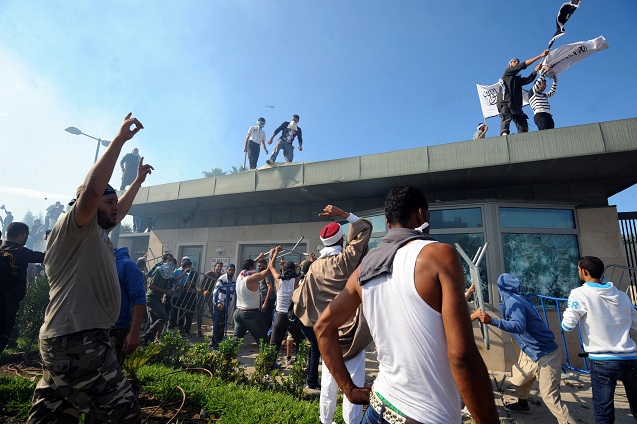When we re inside Sadaka Reut, I believe that everyone is good to each other, said Lena, describing her Arab-Israeli summer camp. But then we go out on to the street, and it s [a different story] .
Seconds later, her point was proven perfectly. On a busy intersection in the heart of Yafo, a middle-aged man cast a disapproving eye over the street exhibition the group were displaying. What s this? he asked with a caustic twang to his voice. It s a Jewish-Arab project . began one of the organizers, but the man had heard enough. Sticking two fingers in the leader s face, he spat F*** you, and stormed off.
The theme of this year s camp is The Untold Story so the presentation contained some uncomfortable truths. Testimonies of residents who lived in Yafo during the War of Independence in 1948 were pinned to large boards alongside poetry, photography and cartoons depicting the plight of those who were expelled from their homes. Passersby were encouraged by the teenage participants to recount their own memories on camera, while others were handed flyers. Hostility abounded in the heat of the midday sun, but there were small pockets of approval from both Jewish and Arab onlookers. According to 17-year-old Hadas, however, whether the public approved or disapproved was beside the point.
It s not important if their reaction is positive or negative – it s about getting their feelings to come out. We re not here to force people to change their minds and [dictate] what is right and wrong. There are many grey areas; we [Jewish Israelis] have good guys and bad guys, and so do they.
For the 50 youths taking part in the camp, listening to each others stories and personal experiences was the essence of the program, according to Adi, one of Sadaka Reut s movement workers. Jews can go through their whole life [in Israel] and never meet a Palestinian, she said, so the camp is very eye-opening for them. For the Palestinians, it s slightly different, since they are forced to see the Jewish side every day, but on the camp we try to create a balanced environment in which they can meet [their Jewish peers].
People are ignorant, and they prefer their ignorance to knowledge, said Ismail, whose family has lived in Yafo for nine generations. This was his third summer spent with Sadaka Reut. My parents are moderate and very supportive of me taking part, and my sister s politics are the same as mine, so we got into this group together.
Ismail and Lena hold strikingly similar visions for the future in their country, with both stressing the need for equality to prevail over religious or sectarian supremacism. It has to be democratic for both peoples, said Lena. Everyone must be treated the same, and no one group can be treated better than others.
All citizens must be equal, agreed Ismail. It doesn t need to be a Jewish state; nor must preference be given to the Jewish people. It just needs to be our country; [a country belonging to both Jews and Arabs].
Listening to the participants talk was like watching a new generation of politicians forging their manifestos in the furnace of youthful idealism; however, I asked one of the leaders, was this handful of teenagers enough reason to hope that a sea change could occur? If we lose all hope, there is nothing more to be done, replied Sama. There is no change without hope. And if we start with teenagers, that s where we can have the most effect. Just watching their interaction with one another is the change we are trying to make .
But for all the enthusiasm of the campers and their leaders, the bigger picture tells a different story when it comes to spreading Sadaka Reut s message on a national scale. The state refuses to fund the organization’s activities, because we are not a Zionist youth movement, noted Fadi Shbita, Sadaka Reut s director. Whilst they do not support Zionism, nevertheless there is no particular political agenda being pushed, he said.
We don t advocate policies such as where to draw borders, and so on, explained Fadi. All we say is that both people have rights here, and that they need to be treated equally. A view which seems pretty inoffensive, yet is reason enough for the authorities not to allocate them a penny of the annual 66 million shekel budget set aside for youth movements.
Despite the frosty reception Sadaka Reut engenders amongst Israeli officialdom, as well as on the Israeli street, Fadi is not entirely disheartened. On one hand, I am optimistic, he said, but on the other hand, it s going to be a very long process [to effect real change in Israeli society]. In the meantime, we can create more and more young activists, at least.
On the strength of those I met during the street exhibition, he and his team have clearly succeeded on that front. And for all the opposition they encounter when taking their message to the public, the participants themselves are building bridges far more resilient than can be toppled by any number of expletives hurled their way by their detractors.
Seth Freedmanis a writer living in Jerusalem. This article is distributed by the Common Ground News Service (CGNews) and can be accessed at www.commongroundnews.org.
